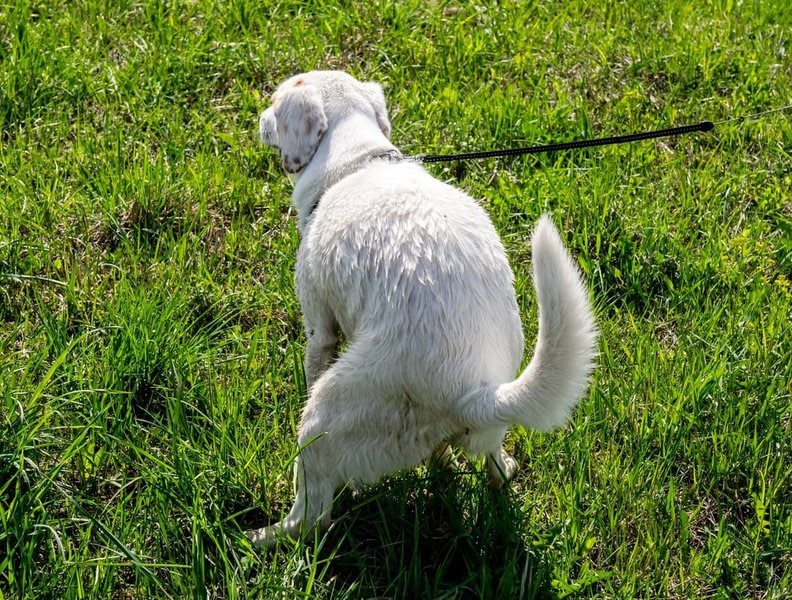Canine diarrhea is a medical condition that most dogs will probably experience at one period or another, and you can trust us when we say having to deal with a dog that can’t seem to stop pooping isn’t a pleasant experience.
So, why do dogs get diarrhea? Dogs get diarrhea as a result of being fed poorly cooked or spoiled food, ingestion of toxic or foreign substances, sudden changes in the dog’s diet, and stress. Similarly, canine diarrhea can also be due to medical conditions such as allergies, as well as bacterial, viral, or parasitic infections.
As we can see from the answering paragraph, canine diarrhea is caused by several reasons ranging from mild to severe, and knowledge of the various causes of this medical condition, as well as the ability to recognize that your pooch is suffering from diarrhea, is essential for quick diagnosis and proper treatment.
And to this effect, symptoms that typically accompany canine diarrhea, as well as how to proceed when you find out that your pooch is suffering from this medical condition, are all outlined in this article. But, before we go into all that, let’s look at all the possible causes of diarrhea in dogs.
Why Do Dogs Get Diarrhea?
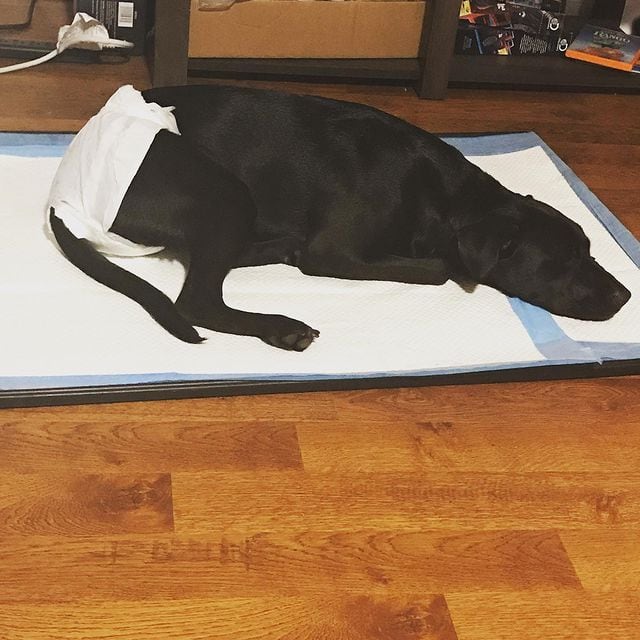
Common causes of canine diarrhea include poor feeding habits, swallowing of foreign or toxic substances, stress, sudden changes in the dog’s diet, allergies, bacterial or viral infections, and the presence of parasites.
Canine diarrhea is a medical condition that typically occurs as a result of faster movement of fecal material through a dog’s intestine, which in turn results in large and frequent amounts of either uniform or loose stools.
This fast movement of fecal material through the canine intestine occurs due to several reasons, some of which are outlined below:
Poor Feeding Habits
As with humans, one of the major causes of diarrhea in dogs is the poor feeding habits to which pooches are usually subjected. Feeding a pooch with spoiled leftover food, eating too much food too fast, or feeding a dog with food that isn’t properly cooked are all situations that can trigger acute diarrhea in our canine buddies.
Swallowing Of Foreign Objects
Additionally, a pooch picking up foreign objects such as glass, sticks, or stones with its mouth and subsequently proceeding to swallow any of these indigestible objects can result in gastrointestinal obstruction and diarrhea.
Ingestion Of Toxic Substances
One of the first signs that a dog has ingested a poisonous or toxic substance is gastrointestinal upset, which typically manifests as the pooch frequently passing out loose stool.
Some of the common domestic substances which can be toxic to a dog when ingested include detergents, sunscreen, and human medication. Plants such as ivy flowers, daffodils, mistletoes, and wild mushrooms are also toxic to dogs when ingested and can induce canine diarrhea.
Stress
Some dogs aren’t particularly fond of going on road trips, and the stress of traveling long distances in a vehicle can induce acute diarrhea in pooches. In the same vein, a dog can develop stress from being introduced to a new, unfamiliar environment, and this can result in diarrhea for such a dog.
Sudden Changes In The Dog’s Diet
The general rule of thumb is to make dietary changes slow and gradual. But if you ignore this and incorporate a sudden change in the type of kibble you’re feeding to your canine buddy, you risk upsetting such a pooch’s stomach, thereby inducing diarrhea.
Allergies
Dogs are allergic to a wide range of food substances, and feeding a pooch with a food substance that doesn’t go well with its body system will upset such a dog’s stomach, thereby causing such a dog to pass out large amounts of loose stool.
Bacterial Or Viral Infections
Raw or poorly cooked meat, decaying vegetables, and meat that has been exposed to air for a while tend to contain bacteria, and when consumed by a dog, can result in bacterial infections which typically induce diarrhea in dogs.
Additionally, dogs are prone to suffering from a number of viral infections such as parvovirus, canine distemper, canine coronavirus, and apart from being life-threatening and highly contagious, these viral infections typically manifest as a dog passing out foul-smelling stool.
Parasites
Dogs tend to pick up a lot of stuff with their mouths, and in the process of doing so, they might end up picking parasite eggs. These eggs typically find their way into a pooch’s gut, where they develop and are hatched into parasites such as roundworms, hookworms, whipworms, and coccidian, just to mention a few.
The activities and movements of these parasites within a dog’s gut typically result in a gastrointestinal disturbance, and the dog will end up developing diarrhea. That said, puppies and adult dogs with weak immune systems are more likely to develop diarrhea due to the activities of intestinal parasites.
Other Causes Of Canine Diarrhea
Apart from those listed above, canine diarrhea can also be caused by:
- Side effects of medication
- Food intolerance
- Inflammatory bowel diseases
- Kidney and liver diseases
How Do I Know That My Dog Has Diarrhea?
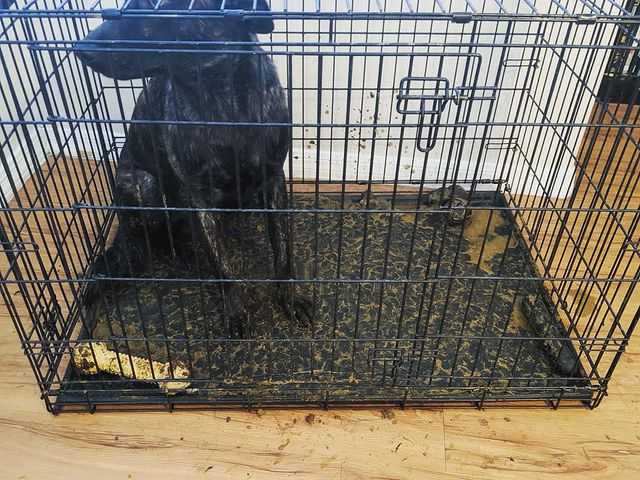
You can mostly tell that your dog is suffering from diarrhea by observing the frequency of the dog’s stooling, as well as the consistency and color of the pooch’s stool.
Frequency Of Stooling
If your canine buddy has suffered through just one or two episodes of diarrhea and is otherwise behaving normally, as well as retaining a healthy appetite, there may be no cause for alarm, and you may not need to contact your vet. Regardless, you should ensure to monitor the pooch’s bowel movements and keep an eye out for additional symptoms.
Passing out small amounts of stool per hour, which is typically accompanied by straining, suggests that a pooch is suffering diarrhea due to an inflammation of the large intestine.
Large bowel diarrhea is typically characterized by symptoms such as:
- Straining to defecate
- The presence of blood or mucus in stool
- An increase in the frequency of stooling, but
- A decrease in the amount of stool passed out each time the dog defecates
And a dog passing out large amounts of stool between three to four times an hour typically indicates that such a dog is suffering a disorder of the small intestine.
Small bowel diarrhea in dogs is often characterized by:
- Production of large amounts of stool at increased intervals
- Production of stools containing fat and froth
- Absence of blood and mucus in stool
- The stool comes out easily
Additionally, dogs suffering from small intestine diarrhea also suffer weight loss and reduction in skin and coat quality.
Color Of Stool
The color of a dog’s stool is also an indicator that such a pooch is suffering from diarrhea, and it can also give an insight into the cause of the dog’s diarrhea.
Normal dog poop is typically chocolate brown in color, but a dog suffering from diarrhea will produce stools that are either orange, black, green, red (due to the presence of blood), or gray in color. These colors typically occur in pooch stool due to a problem with the dog’s food or due to a liver or pancreas problem.
How Can I Treat Diarrhea In My Dog?
Treatments of diarrhea in dogs are largely influenced by the underlying causes of this condition. Fasting, home remedies such as rice water, pumpkin, plain yogurt, and plain white rice are also effective at treating mild cases of diarrhea in dogs.
Contact Your Vet
If your dog just doesn’t stop pooping, you observe the presence of blood in the pooch’s poop or abdominal swelling, such a dog is suffering from acute diarrhea, and at times, this can be an indicator of a more serious medical condition such as toxic poisoning.
Hence, to guarantee your fido’s safety, the first thing to do when you notice that the pooch won’t stop pooping is to book an appointment with your vet.
Typically, your vet will ask you to bring along a fresh sample of your dog’s poop, as the color, smell, and shape of the poop are effective tools in diagnosing the cause of your canine buddy’s diarrhea. You will also be required to answer questions pertaining to the consistency of the dog’s poop, as well as provide a brief history of your dog’s feeding habits.
Medication Used To Treat Diarrhea
In addition to the answers provided to the questions asked, the results of tests carried out on your dog’s poop help vets prescribe treatments for canine diarrhea.
Most times, vets will prescribe over-the-counter medications, including dewormers such as Panacur, Drontal, and anti-diarrheal agents such as metronidazole and tylosin to treat mild cases of canine diarrhea that aren’t caused by an underlying medical condition.
Probiotics and supplements can also be useful in treating canine diarrhea, although these shouldn’t be used without a vet’s prescription.
Acute diarrhea caused by underlying medical conditions resulting in extreme fluid loss typically requires treatment in the form of hospitalization and intravenous fluid treatments to restore lost body fluids.
Fasting The Dog
For adult dogs suffering from mild cases of diarrhea, your vet may recommend that you withhold from feeding the dog for a period ranging between 12 to 24 hours.
However, you are to continue offering the pooch water at all times to prevent dehydration. Withholding food gives the pooch’s stomach a chance to settle, thereby helping to reduce and subsequently eliminate its diarrhea.
Feeding A Bland Diet
If, however, you’re wary of starving your canine buddy for an extended period, your vet may prescribe an easily digestible diet that should be fed to the dog at regular intervals.
The recommended diet typically contains prebiotic fiber that helps relieve the pooch’s intestinal tract, whatever triggered the gastrointestinal disturbance and diarrhea.
And as your dog’s stool returns to normal, you can reintroduce its normal diet by mixing a gradually increasing amount of this diet with the specially prepared bland food.
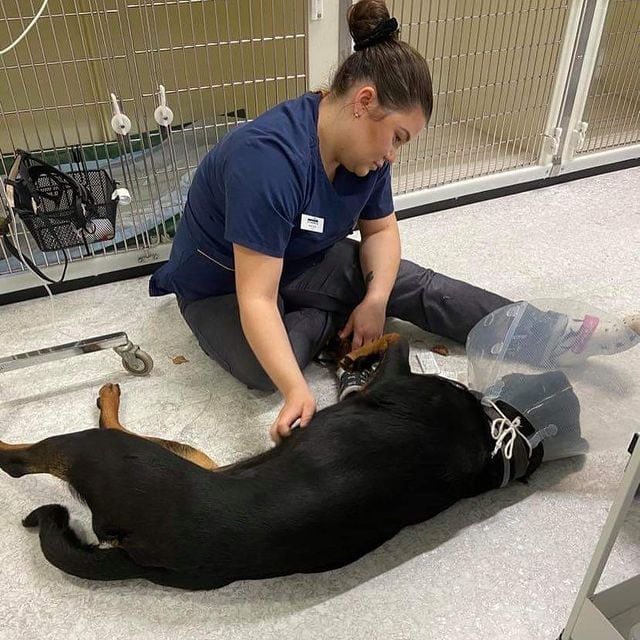
What Natural Remedies Can I Use To Treat My Dog’s Diarrhea At Home?
Some natural remedies which can be effective at treating mild cases of canine diarrhea at home include:
Pumpkin
Pumpkin contains a healthy amount of fiber – which has been proven to be beneficial to the canine system – and by feeding your pooch with a 100% pumpkin puree, pumpkin powder specially prepared for dogs, or canned pumpkin for dogs, you can provide instant relief to a dog suffering from diarrhea.
Plain Yogurt
If your pooch is lactose tolerant, feeding plain yogurt with active cultures can help stem the tide and curb your pooch’s diarrhea.
Slippery Elm
Slippery elm is a gentle herb that contains properties that are effective at soothing a pooch’s mucous membranes, and it can be equally effective at treating a dog’s diarrhea at home.
Plain White Rice
By feeding a dog with plain white rice or rice water obtained from boiling high-quality rice in a lot of water, you can provide temporary relief from diarrhea, thereby giving your pooch’s stomach a chance to settle. Bland food such as eggs prepared without butter or oil and skinned chicken are also great choices to settle a dog’s gastrointestinal upset.
How Can I Prevent My Dog From Having Diarrhea?
You can prevent your dog from having diarrhea by gradually introducing new diets, maintaining strict compliance with your dog’s existing diet, and minimizing exposure to toxic substances.
Dogs take a lot of substances into their mouths on a daily basis; Hence, it can be a herculean task trying to prevent your dog from having diarrhea. However, by putting certain measures in place, some of which are outlined below, you can minimize the risks of your dog contracting diarrhea.
Gradually Introduce New Diets
By allowing your pooch’s digestive tract time to adjust to new diets, you can reduce the risk of diarrhea in your dog. It is thus recommended that you gradually incorporate the new meal into the pooch’s current dietary plan.
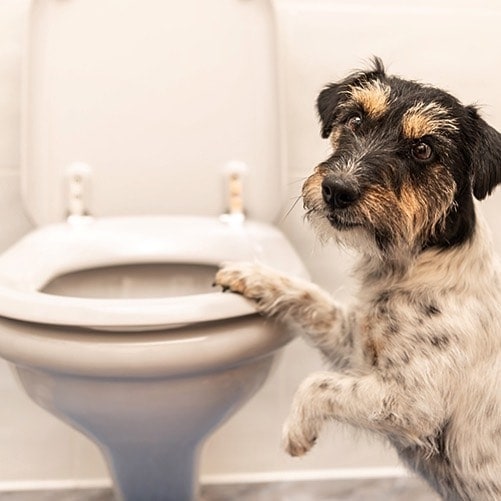
Maintain A Strict Compliance To Your Dog’s Diet
Reduce the urge to feed your pooch with table scraps, and if you’re feeding your canine buddy with meat, ensure it is fresh and properly cooked. Feeding your pooch with too many dog treats can also result in gastrointestinal upsets, hence keep this to a minimal level.
Minimize The Dog’s Exposure To Toxic Substances
Common household items, such as human medication, cleaning agents, and sunscreen, that can be toxic to dogs when ingested should be kept well out of the dog’s reach. Similarly, the growth of toxic and poisonous plants around the house shouldn’t be encouraged.

